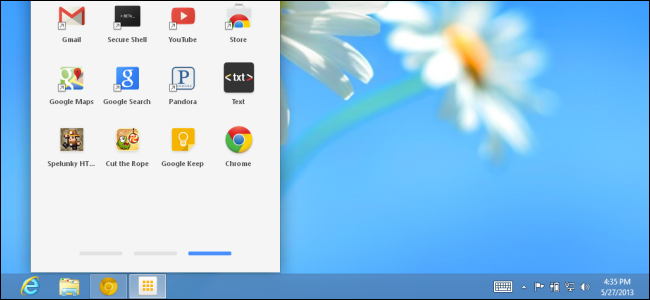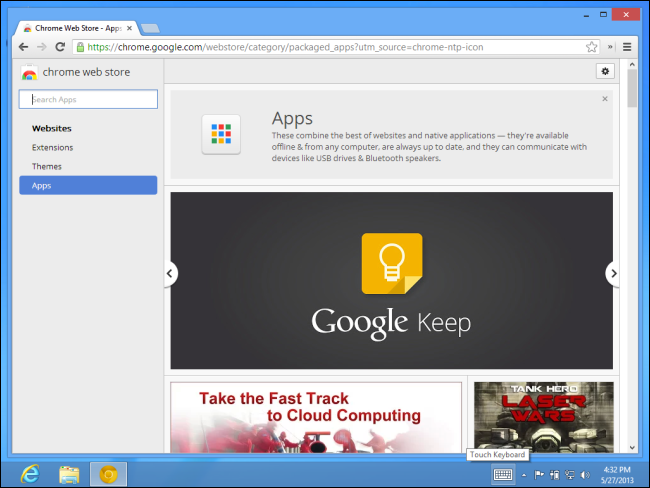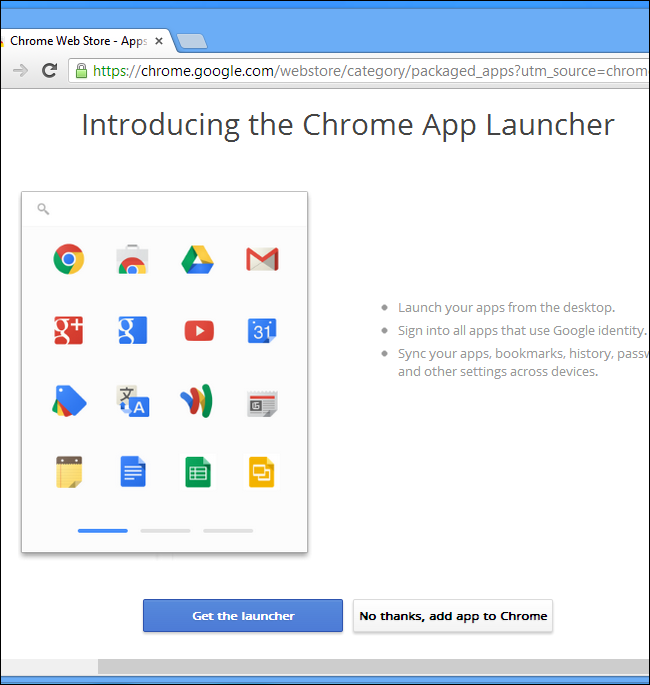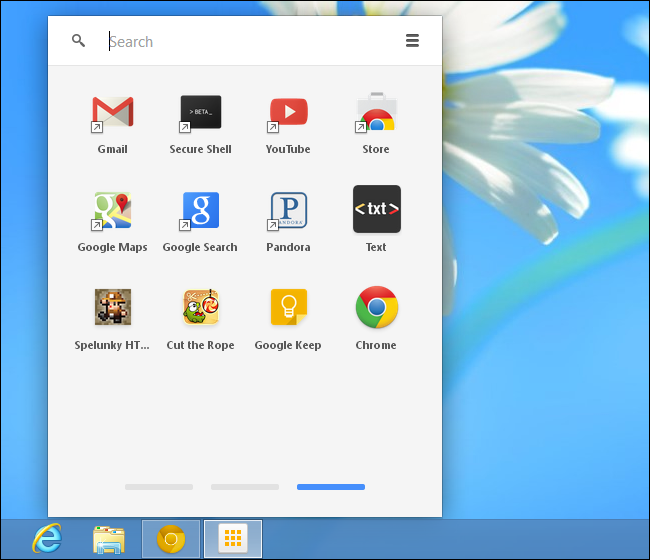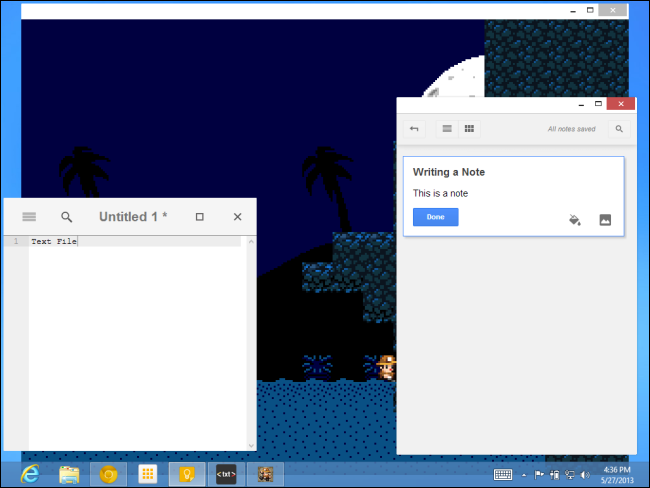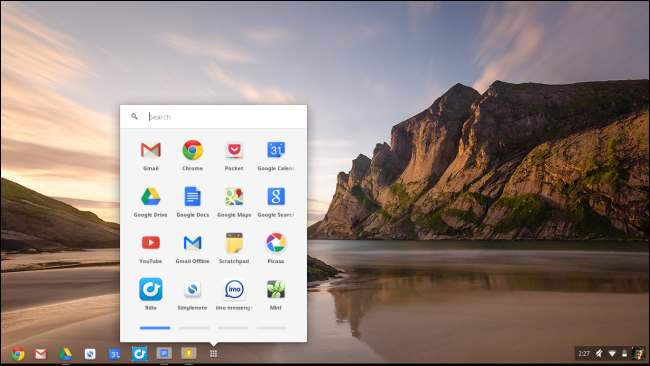Quick Links
Google didn't announce any shiny new Chromebooks at Google I/O. Instead, they highlighted their two big "platforms" -- Chrome and Android. Whether you're using Windows, Linux, or Mac, Google will be bringing the Chrome OS experience to you.
Chrome has always been Google's vision of the browser-as-operating-system. They're about to take it to the next level, using Chrome to provide apps that run outside the browser on desktops and laptops. Google wants to slowly turn your Windows laptop into a Chromebook.
Introducing Packaged Apps
If you have looked in the Chrome Web Store, you'll know that most current Chrome "apps" are links to websites. For example, the Netflix app is just a link to Netflix, and the Evernote app is a link to Evernote's website. Install an app, and you'll get a large icon for it on your new tab page, but that's about it.
However, Google is about to change the definition of an "app." This change hasn't rolled out to everyone yet, but it's currently on Chrome's developer channel. Everything currently in the Chrome Web Store will move to the new "Websites" category. The main "Apps" section will only contain new packaged apps.
A packaged app is a web app put into an offline package containing HTML, JS, and other web technologies -- but no Flash content. Packaged apps will run entirely offline by default and will sync with the cloud. Packaged apps will even run in their own windows, outside of the browser.
Chrome as a Platform on Your OS
When you install a packaged app, Chrome will offer to display a Chrome OS-like "Chrome App Launcher" on your Windows taskbar. (This works similarly on Mac and Linux, but is currently in development.) This launcher will display your installed packaged apps and allow you to quickly launch them. When you launch one, it will appear in its own window on your desktop, complete with its own taskbar entry.
This acts as a sort of Chrome-only Start menu -- Microsoft has removed their Start menu from your Windows taskbar and Chrome wants to take its place. The Chrome Web Store can evolve to function as a sort of app store for cross-platform, offline-enabled web apps that run on every PC operating system.
To clarify the difference between packaged apps and "old" website apps, a shortcut icon will be placed over all the old apps that are just shortcuts to websites.
Example Packaged Apps
You can actually install these packaged apps on the current stable version of Chrome today, assuming you have direct links to the apps -- they won't appear in searches yet. Current packaged apps include an offline text editor with syntax highlighting, a Cut the Rope Game, the Any.DO to-do app, Google Keep note-taking app, and more. These apps all function entirely offline and can sync when you go online. They run in their own and can support touch input, so they could work on a touch-enabled Chromebook or just in Chrome on a touch-enabled Windows laptop.
Use enough packaged apps and your Windows desktop will start to look an awful lot like a Chrome OS system. Packaged apps can use all of Chrome's advanced browser features, from NaCL for running native code to WebGL for 3D graphics.
Chromebooks in 10 Years
Google is happy to keep selling Chromebooks for schools, businesses, and as second, third, or even fourth devices for people that want a simple web-browsing gadget to play with. But they're not trying to position the Chromebook against Windows and Mac laptops for everyone -- not yet. There's a reason the Chromebook Pixel's tagline is "For What's Next."
Google wants you to start using packaged apps in preference to desktop and Modern apps. Developers will have an incentive to create these packaged apps because they'll work on every operating system and they can be created with web technologies -- and unlike Microsoft's Modern apps, they can integrate with the traditional Windows desktop workflow and taskbar.
This gives Chrome users a path for gradually switching to packaged apps that will work on Chrome OS. Google won't need to care if you're using a Chromebook -- if you're using a Windows computer and use mostly Chrome packaged apps, they'll be happy.
As people switch to more and more packaged apps on Windows and Mac, a Chromebook will eventually start to make more sense -- why not get a Chromebook once you start using Chrome packaged apps exclusively on your Windows or Mac laptop, anyway? A Chromebook is much more simple, so it's a no-brainer if you only use packaged apps.
You'll find packaged apps appearing as the only "Apps" in the Chrome Web Store as soon as this feature reaches Chrome's stable channel. The websites section will remain, providing a way of discovering web apps.

